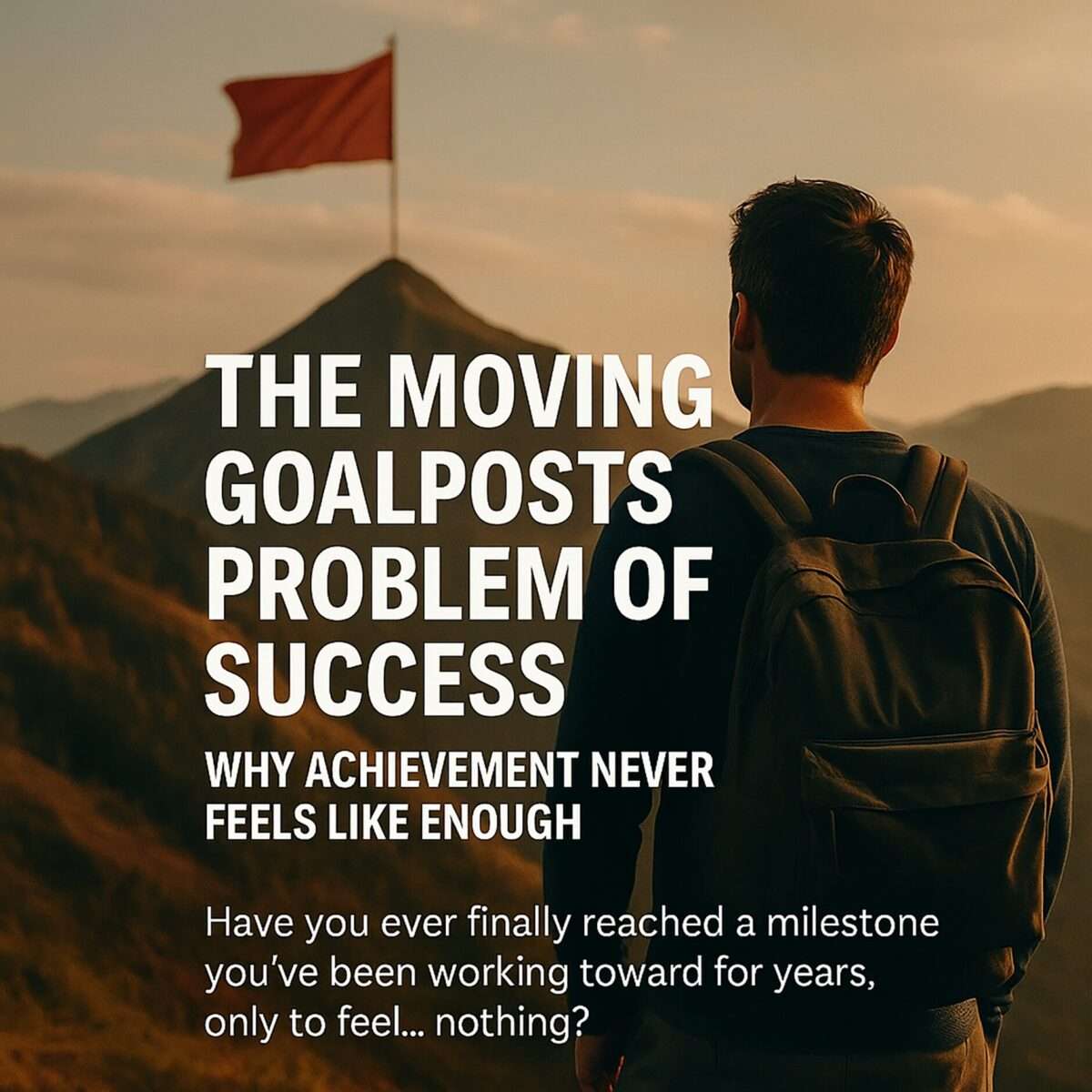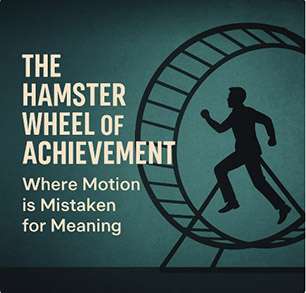Have you ever finally reached a milestone you’ve been working toward for years, only to feel… nothing? Or perhaps just a fleeting moment of satisfaction before your mind immediately shifts to the next target?
You’re not alone.
“I’ll be happy when I get the promotion.” Then you get it. “I’ll feel secure when I have $100,000 saved.” Then you reach that number. “I’ll be content when we move into a bigger house.” Then you unpack the boxes.
But the satisfaction never lasts, does it? The goalposts always seem to move just as you reach them.
The Endless Mountain Climb
This phenomenon is what psychologists call “hedonic adaptation” – our tendency to quickly return to a baseline level of happiness despite major positive or negative life changes. But I believe it goes deeper than that.
What if the entire system of achievement-based fulfillment is fundamentally flawed?
Think about it: our culture has conditioned us to believe that life is an upward climb. Each step—each achievement, each acquisition, each milestone—is supposed to bring us closer to some vague summit where we’ll finally feel complete.
But what if we’re climbing the wrong mountain entirely?
The False Map We All Follow
In the Christian parable novel, “THE CALL,” the protagonist finds himself literally on a mountain, desperately climbing toward what he believes will bring fulfillment. Surrounded by others doing the same, he follows a map everyone insists is correct—a map of achievement, recognition, security, and self-actualization.
Sound familiar?
We’re all following similar maps:
- Career advancement as the path to significance
- Financial milestones as the path to security
- Social validation as the path to belonging
- Achievement as the path to worth
But these maps are fundamentally flawed because they’re based on a profound misunderstanding of human identity.
What Your Soul Actually Craves
The truth that “THE CALL” gently reveals is that your worth was never meant to be earned. Your identity was never meant to be achieved. Your security was never meant to hinge on your performance.
When success feels empty, it’s not because you haven’t climbed high enough. It’s because:
- You’re climbing toward what you already possess – Your value and identity are gifts, not achievements
- You’re functioning from the outside in – Seeking external validation for internal worth
- You’re chasing what can never satisfy – Material success can’t fill spiritual needs
The problem isn’t your ambition—it’s the belief system underneath it. The belief that you are somehow incomplete until you reach the next level.
Finding True Fulfillment Beyond Achievement
So what’s the alternative? Living from the inside out.
Imagine waking up tomorrow with nothing to prove, nothing to earn, no need to justify your existence or worth. Imagine functioning from fullness rather than lack—giving because you’re already full, not giving to fill an emptiness.
This isn’t about abandoning goals or ambition. It’s about transforming why you pursue them:
- Not climbing to become someone, but expressing who you already are
- Not working to earn love, but working from a place of being loved
- Not achieving to gain worth, but achieving as an expression of inherent worth
This kind of living isn’t just more fulfilling—it’s also more effective. When you’re no longer driven by fear of failure or obsession with validation, you’re free to take risks, to innovate, to love boldly without the constant anxiety of measuring up.
Breaking the Cycle
Breaking free from the moving goalposts problem starts with recognizing the false map you’ve been following. It continues as you embrace a new understanding of your identity—one not based on climbing, but on receiving what’s already yours.
This journey isn’t a one-time decision but a daily choice to live from truth rather than striving. It means unlearning deeply ingrained habits of thinking and replacing them with new ones.
For many, including the protagonist in “THE CALL,” this journey involves a profound spiritual awakening—a recognition that in Christ, we are already complete. Already loved. Already enough.
And from that place of completeness, real life begins.
Want to go deeper? THE CALL is a Kingdom parable that gently exposes why you still feel spiritually drained despite all your achievements—and leads you into true identity, rest, and purpose. Experience the freedom of knowing who you really are. Special FREE offer, pay for shipping only. Get your copy today at graceempoweredliving.com/call





